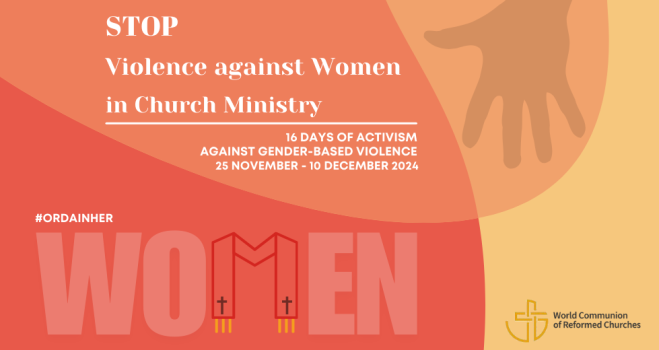The World Communion of Reformed Churches (WCRC) stands in solidarity with the United Nations’ 16 Days of Activism Against Gender-Based Violence. In a world where human rights, including the rights of women and girls, must be fully respected, it is disheartening that women and girls continue to face various forms of gender-based violence. Despite some progress, this pervasive issue remains deeply entrenched in society, requiring urgent action and a collective commitment to ending such injustice.
This campaign is part of WCRC’s Internship Program on Gender Justice, which equips interns with tools to advocate for equality and challenge systemic injustices faced by women and girls globally.
Understanding Gender-Based Violence
Gender-based violence is defined as “an umbrella term for any harmful act that is perpetrated against a person’s will and is based on socially ascribed (i.e., gender) differences between males and females” (WCRC Gender Justice policy). This form of violence, which disproportionately affects women and girls, is not only physical but also emotional, psychological, and economic, manifesting in many areas of life, including the church.
Personal Reflections on Gender Roles in the Church
Jooeun Kim from South Korea and Gemma King from Scotland, participants in the Gender Justice Internship Program, shared their reflections on the role of women in the church and the obstacles they face in ministry due to gender-based norms.
Jooeun Kim writes:
“I would like to share a personal experience from my time at church that highlights the deeply ingrained gender roles I observed growing up. In the church community I was part of, women’s roles were predominantly confined to the kitchen. The worship leader was always male, and women were relegated to supporting roles, such as backup singers. Women were often seen as kitchen volunteers, ushers in neat uniforms, or flower arrangers for the altar, while the ‘great pulpit’remained the exclusive domain of men. Although there have been some positive changes over time, it is both frustrating and disheartening that, as women, we are often pressured by an entrenched, authoritative attitude that expects us to feel ‘grateful and content with this level of progress.’ This reality serves as a stark reminder of the progress we’ve made, but also of the long road ahead in our fight for true equality and the eradication of all forms of gender-based violence.”
The Struggle for Equal Participation in Church Ministry
Women in church ministry often face barriers to fully sharing their gifts and participating in God’s work due to entrenched gender norms. A significant issue is the denial of ordination for women. The image of women pastors in many churches is often highly sexualized, with women judged based on their beauty, family status, and age (The Communique of the Gender Leadership Consultation) , rather than their abilities and calling. Furthermore, many churches remain silent on matters such as sexual harassment and gender-based violence, leaving victims further vulnerable.
This systemic denial of women’s leadership is a form of violence against the Christian faith itself, as it contradicts the belief that all people are created in God’s image. The exclusion of women from leadership roles within the Church not only silences their voices in important decisions but also perpetuates the cycle of gender-based violence, as issues affecting women may be ignored or minimized by those in power.
Gemma King shares her thoughts:
“I have been inspired by all the women ministers in the church whom I grew up with in my home church. The stories of the abuse faced by those who campaigned for the ordination of women were shocking to me and made me appreciate those pioneering women even more. Despite the number of ordained women in Scotland, the public image of the minister is still overwhelmingly that of an old white man. Only two Scottish novels feature female ministers, and there are no TV series or films portraying them. This image needs to change for women to be fully accepted as ministers in Scotland and other churches as well. Women and men are equally created in God’s image.”
Standing Together for Change
During the 16 Days of Activism Against Gender-Based Violence, we stand united in the powerful call to #ordainher. The denial of women’s access to the pulpit and the refusal to grant them ordination is a form of gender-based violence that must end. This campaign, shaped by the voices of Gender Justice interns like Gemma and Jooeun, empowers the cessation of all forms of violence directed at women around the world.
Get Involved
If your church is facing challenges regarding the ordination of women, we invite you to reach out. We are here to accompany you, our sisters, in the process of “ordaining her.” Together, we can make a difference.
Email: gender.audit@wcrc.eu


